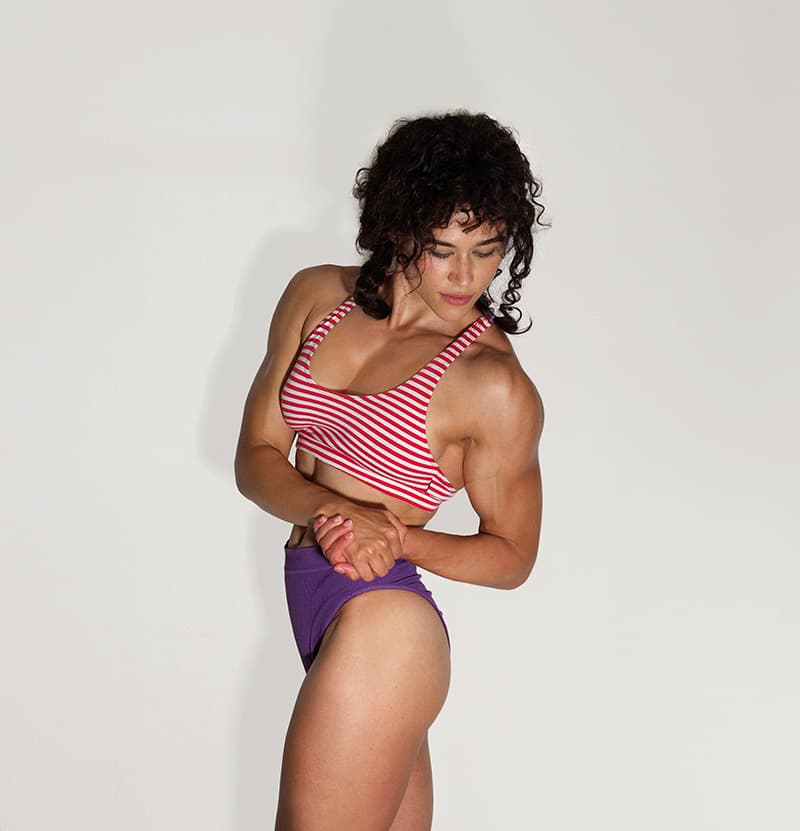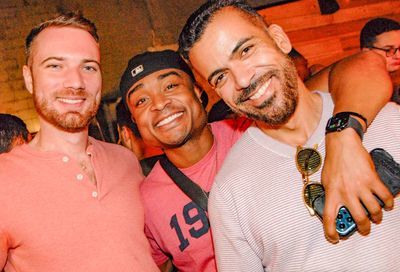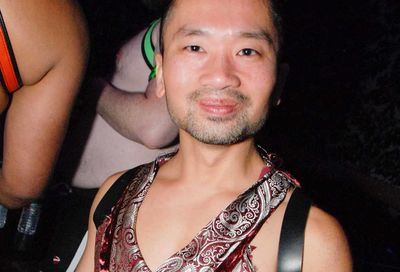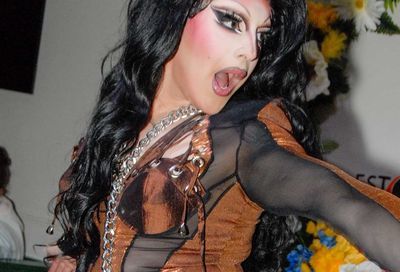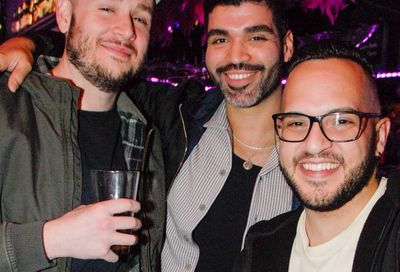Woman in the Life
Sheila Alexander-Reid's journey from lesbian nightlife to nonprofit
Sheila Alexander-Reid is a little shaken when she arrives to be interviewed. She explains that earlier in the day, she found signs on her car, posted anonymously by someone who seems to feel it necessary to warn her that slander is a crime. She has no idea why anyone would want to send her the message, she says, adding that she’s simply concerned that whoever did it knows where she lives.
That Alexander-Reid may have said something to ruffle someone’s feathers, however, is not surprising. She’s got strong opinions and she’s not one to keep them to herself. But her outspokenness is just the spice. The entrée is something much more powerful: her sense of community.
D.C. really got to know Alexander-Reid as the party promoter who offered the beat for the city’s lesbian-of-color nightlife. But in 2002, Alexander-Reid’s party-production company, Women in the Life, morphed into the nonprofit Women in the Life Association, with the aim of making the world a better place. She says she still knows how to throw a great party, though, pointing to a Super Bowl XLI party she helped throw. Still, at 47, she’s a little reminiscent about the old days.
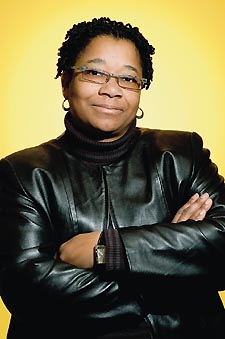 Reid |
”I’m newly divorced from my partner of 11 years, and as I go out now to these clubs and ladies nights, the crowd is inevitably under 30 — usually under 25. I’m just looking for anybody over 30 just to socialize with.”
Till then, her two beagles, Lucy and Max, will have to take up the slack. ”They’re my two closest friends of late.” She’s also got the neighbors to turn to — Mayor Fenty, in particular, who lives a few doors down. ”I put a lot of time and energy into being an Adrian Fenty advisor.”
METRO WEEKLY: So, you’re a Cincinnati girl?
SHEILA ALEXANDER-REID: Till I was 11. If you’re gay, Ohio is just not a good place to be.
MW: You moved to the D.C. area and found you had a flair for parties?
ALEXANDER-REID: My brother and I used to have a lot of parties in our house in high school. This was in Bethesda. My parents were avid bridge players and they’d go to a lot of tournaments out of town, leaving my brother and me in charge.
When I came out — I believe there were one or two clubs — there wasn’t a lot of choice. I’m going to say I was 28, during the late 80s.
I knew from having parties myself that I could do better, so I started throwing parties. First it was by myself, then with two friends, Chris Vera and Lisa Thornhill. We called ourselves ”VTR,” for Vera, Thornhill and Reid. We threw parties at Tracks and a couple little places over in Southeast that no longer exist. That was the beginning.
MW: Looking at D.C. nightlife at the time, what did you see?
ALEXANDER-REID: There was Hung Jury, and there was Hill Haven and the Phase. That was it. The Hung Jury was white, predominantly; Hill Haven was black, predominantly; and the Phase was white, predominantly. So as far as I was concerned, my only choice was Hill Haven. You saw the same people. You could almost predict the order of the songs. It became boring. So I thought, ”Hey, let me liven this up, find a venue and do this myself.” So that’s what I did. It took on a life of its own. After VTR broke up, I think there was a year before I came back with my own company and called it Women in the Life (WITL). That was 1993.
MW: That’s when you threw your first huge party, the party to coincide with the 1993 March on Washington for Lesbian, Gay and Bi Equal Rights and Liberation?
ALEXANDER-REID: That wasn’t the first WITL party, but it was the one that put me on the map. I was able to take my ideas and implement them without having anyone else’s input, and I liked that.
WITL was my own company, but I had a large support network of friends. I had friends working as security, as bartenders, doing promotion. We decided to go out to the march and just hand out 5,000 fliers. We called ourselves the ”unofficial women’s after-party.” It was in this huge warehouse in an alley at Ninth and N [Streets NW] that just sort of lent itself to being this great underground space.
What made this party different was that all the previous parties — even house parties — that I’d done, were always primarily black lesbians, just my friends. This party, we marketed to strangers: black, white, German, Japanese. And they all came and it was a beautiful sight. It wasn’t just a lesbian-of-color party. It was an international party. There was a group of Asian women who at some point in the night all decided to take their shirts off — maybe six to 10 of them in a circle, jumping up in down. It was that sort of spontaneity that permeated the entire event.
The police came because there was a line all the way down the alley to get in. They saw that it was filled to capacity, but it wasn’t overfilled. And they saw there was no hostility, animosity or any kind of threatening behavior. They said they were staying just to make sure, but believe you me, they stayed to look at those women with no shirts on. And they had a great time.
It was just a really good time. We were able to get a one-day liquor license so we could control the sales at the bar. It was something you’d have a hard time doing these days.
MW: Because of the liquor license?
ALEXANDER-REID: Because of finding a space cheaply. I think we paid $300 to $500 for that big warehouse. All the staff being my friends, so I could pay them in drinks or $50. Something like that would cost $10 to $20 thousand now.
It was really an incredible experience. I can honestly say that’s the best party I ever had, and I’ve had some really good parties. But I’ve been unable to match that because of the global nature of it. I went back to having lesbian-of-color parties. They were open to any lesbians, but it’s sort of an audience that chooses itself. Because I’m a lesbian of color and because that’s who I have access to, that’s who comes to the parties primarily.
MW: Did you have a good time at that party?
ALEXANDER-REID: I had a terrible time. [Laughs] The bathroom toilets were overflowing. I think we ran out of liquor. I think we ran out of some food. People were complaining about being in the line a long time, since we were filled to capacity. So I was totally stressed. I’ve been stressed at every event I’ve ever had because I’m constantly trying to anticipate something going wrong, and to be prepared for it. Especially when it’s filled to capacity, you’re always worried about someone getting hurt. Knock on wood, I’ve escaped that.
MW: It seems like there’s a certain artistry to throwing a good party. Is organizing a party a sort of artistic expression for you?
ALEXANDER-REID: It is. I get it from my mother, who is still hosting events to this day. From my parents to my siblings, we were always very sociable, always had friends over. I go stir-crazy if things are quiet for too long.
MW: What’s the secret to throwing a good party?
ALEXANDER-REID: The devil is in the details. Do not think you can have a DJ and make a flier and open the doors, and that’s all you have to do.
From the price of the drinks to the attitude of the door staff, to the attitude of the venue owner — all of that makes a big difference. The No. 1 rule: Make sure you keep toilet paper in the ladies room. Keep the bathrooms clean. We got more complaints about that than anything else. It’s all those little details that people tend to overlook.
MW: What prompted you to transform the business into the non-profit Women in the Life Association? What moved you from social to civic?
ALEXANDER-REID: The crowd at the parties was getting younger and younger. The crowd went from 30-something to 20-something. Younger people are — I’m being polite — a little hot-headed.
The parties were making money, but I didn’t enjoy them. I didn’t know anyone at the parties. I decided that perhaps my era had come and gone, and I decided it was time to pass the torch.

View photos from the November 5, 2005 Women in the Life Party
Now, what made me start a non-profit, two words: Wanda Alston. She saw the potential in me long before I saw it. She said, ”Sheila, you have this following. You’re smart. You’re college-educated. You came from a family of privilege. You can do so much more for our community than throw parties.”
Just as we were trying to find our way with the [non-profit] WITL Association, Wanda was killed. Her close friends met to create her funeral program and to put together all the arrangements. We were traumatized by the fact that she was killed so suddenly, but we were further traumatized by the fact that the family did not want to mention that she was a lesbian and did not want any mention of her partner in the program. Wanda died without a will. As a result, her family was in charge of her funeral arrangements. I saw how her life as a human-rights and gay and lesbian activist was all but deleted from this lasting program that was going to provide a lasting memory of her. It just really, really ate me up inside.
Several of her friends met for group-therapy sessions for several weeks afterward. One of the things that came out of the sessions was, ”We have to make sure this never happens to anybody else we know.”
I was talking to Donna Payne from the Human Rights Campaign. I said, ”Donna, somebody needs to do a project or a program that educates the LGBT community about the importance of having a will.” She said, ”Sheila, that’s what you should do. That’s what WITL should do.” And I said, ”You’re right.”
MW: What’s the scope of the WITL Association?
ALEXANDER-REID: We’re a social-justice organization. We also enact programs that bring about cultural affirmation.
The open-mike sessions we do on the second Tuesday of every month are the cultural-affirmation component. We had a program called WOMB — Women-Owned and Managed Businesses — sort of like a lesbian-of-color board of trade. But that’s been dormant for the last two years. It was put on the back burner when we started the Wanda’s Will Project.
We just had a strategic-planning session and we’re about to introduce a couple of new programs. I’m advocating that the board start a program around domestic violence in our community. The pervasiveness of violence in these clubs where young women go is really sort of a dire need that’s being ignored. There are a lot of dynamics going on there that need attention. I think that since this seems to be occurring in the lesbian-of-color community — and don’t get me wrong, I’m sure it occurs in other communities — I believe that we as a lesbian-of-color organization have a duty to address that, or at least talk about it. I don’t know that we can cure it or reduce the numbers, but I do know that the first thing you have to do is stat talking about it.
It’s sort of a taboo subject. No one wants to talk about domestic violence or alcoholism, but these are very real issues.
MW: When you were promoting parties regularly, was violence among young lesbians of color a trend you spotted?
ALEXANDER-REID: It was rare, but yes. We had a really good security guard who could carry out two women at a time. And that happened a couple of times at the Hung Jury, where two women would be fighting, and he would get each one and carry them out at the same time. That was another reason why I decided my time as a lesbian event promoter may have come and gone.
I think there’s a tendency that being lesbian at a younger age, coming out at a younger age — like in high school — is very trendy. And I think that younger lesbians really get caught up in those ”femme” and ”dom” roles. It’s very disconcerting.
Perhaps there are not enough role models, or continuity among the generations, but somebody needs to tell them, ”You are not a man. There’s no need for you to be beating on your girlfriend.” Not that a man should be, either, but there’s no need for you to be so possessive and easily threatened and easily disrespected. It’s all this machismo that is sort of spiraling out of control. I think you see a little bit of this violence in schools as well. It starts in schools. When I was on the board of [the Sexual Minority Youth Assistance League], I saw some of it there as well. Now it’s sort of just going out into the clubs.
MW: How should this problem be addressed?
ALEXANDER-REID: It’s real easy to get people to come to a Wanda’s Will workshop. You don’t have a will — there’s no shame in that. To say, ”I want all the domestic-violence abusers to come to this workshop,” no one is going to show up. First of all, I doubt we’ll call it a domestic-violence workshop. I want to call it something like, ”No More Drama,” based on the Mary J. Blige song that everyone can relate to. I would hope that most of us would realize we don’t want any drama in our lives. My idea is to talk to some victims of domestic violence, and perhaps some former domestic-violence abusers. Perhaps we’ll interview them or videotape them, but find out what happens in their lives to make them either accept the violence or inflict the violence. We’ll take their stories to the community.
I don’t profess to be able to stand up and preach that this is right or this is wrong. I would like these young women to hear from other young women. I would like to bring about awareness in the community, because a lot of people know their friends who are aggressive towards their partners, and they seem to think that they need to look the other way. We need to take the blinders off and expose this taboo subject and create a domestic-violence hotline. If you have a friend who you know is in an abusive relationship, either on the inflicting side or on the receiving side, call this hotline. Or call us and let us send them this video or [get them to] come to this workshop.
I don’t know how exactly we need to do it. Make postcards and flood all the clubs, because that’s the only thing they seem to notice. That’s the new publication of choice: postcards. The lesbian and gay community, like most communities, doesn’t want to air its dirty laundry. But these things come back to haunt you later. I’d like to catch this thing early. It’s okay to be lesbian and it’s great to be out in high school, but that does not give you the right to bully other women into being your girlfriend or accepting your lifestyle. It seems like we’ve gone from out and proud to out and abusive and proud.
MW: Proud of being abusive?
ALEXANDER-REID: Yes. And that’s really sad. It’s a sad commentary on our community. Just as we were victimized when Wanda was killed and further victimized when her family did not embrace her gayness, we’re victimized by this happening to our youth. And further victimized by turning a blind eye to it.
Because they’re gay doesn’t give them carte blanche to behave in any way they like. That reflects badly on the entire community. When Rev. Willie Wilson was saying that lesbians are taking over the schools, as much as I doubt the veracity of that statement, I can understand where the perception came from.
We’re estranging ourselves from them, saying we don’t want to be part of that. They’re already estranged from their families. They’ve probably already been gay-bashed at school, so they turn to this hard-exterior mentality, that they have to be hard and abusive in order to survive. And then there’s a whole segment of women who are attracted to that. So it’s really, really scary. It’s a self-fulfilling prophecy.
One of the things that Wanda really cared about is youth. I don’t know if we’re ever going to see the results of that [GLBT community] summit that was her legacy. But I was there and I do know that one thing that everybody agreed on that should be addressed was programs that target our youth. Whoever gets this job as the mayor’s liaison [to the GLBT community] needs to make that a priority.
MW: I understand you’re backing WITL Association board member Khadijah Tribble to direct Mayor Fenty’s Office of LGBT Affairs. What would she bring to the office?
ALEXANDER-REID: I said we should have a priority: youth. She worked with youth at Covenant House. She has a son of her own. Actually, she and her partner together have three kids. Not only that, when Khadijah worked on the Kweisi Mfume campaign, she personally turned him around on the same-sex marriage issue. That suggests to me that there is some strong power in her words and some wisdom way beyond her years. She is passionate about equality and justice, and she’s passionate about youth.
MW: What’s the counterpoint to the argument that such an appointment would make Tribble third of three lesbians of color to direct the office since it became a cabinet-level office; that a gesture needs to be made toward greater diversity in this office?
ALEXANDER-REID: The counterpoint is, I believe, that the office was created to give the African-American community access to the mayor. In general, women of color fall at the bottom of the totem pole. [Gesturing placements in a descending order] You have white, straight men; white, straight women; black, gay men; and black lesbians.
To have a black lesbian in that position of power is key, and I think that it’s not by accident that Mayor Anthony Williams put [Alston] in that role. I think that as long as we can find strong, qualified, African-American lesbians, then that’s a job we should be able to count on.
MW: On the WITL Association Web site, you refer to lesbians of color as a ”silent segment.” Is the silence by choice, oppression or something else?
ALEXANDER-REID: I would say it’s silence by lack of organization. By lack of representation. And by being a minority. Silent because of indifference and being ignored by other communities.
MW: Do you point to lesbians of color and say, ”Speak up,” or to others and say, ”Stop keeping us down”?
ALEXANDER-REID: I speak up, period, so there’s at least one voice. And I always want people to understand that you cannot have your agenda and then invite lesbians of color to join you for diversity. If it’s me you’re talking about, you have to invite me before you set the agenda. That has been a battle I’ve been fighting for about 15 years.
I’m constantly trying to make other lesbians of color and lesbians, period, more active politically. If I could harness that energy from the dance floor into a [political] platform or into a voting booth, we could make a lot of great strides. There’s a lot of apathy because of the fact that we’ve had no representation and we’ve had no one asking our opinion. We’ve been ignored as a source of power. We have no power because we have no spokesperson, no one counting us in or counting on us.
MW: Last spring, you sat on a panel discussion hosted by the D.C. Coalition titled ”The State of the Black Gay Community.” Let’s revisit that topic, and add the whole of GLBT D.C. to the mix.
ALEXANDER-REID: The most distinct thing that I see about the state of LGBT D.C. is that it is polarized, always has been. Most people seem to ignore that.
I’m one of those people who is always trying to change that. From an early age, I was the only black girl in my all-white class. I learned how to survive and make friends across racial lines. By being comfortable whether I’m in a room with all white people or all black people or mixed, I find it disheartening to see such polarization. That’s one of the things that has contributed to lesbians of color not having a voice. They are not reaching out to the white community, and the white community is not reaching out to them. They’re both at fault.
MW: How would you throw a party to bridge the gap?
ALEXANDER-REID: I’ve done that. I’ve had a party to get everyone together. Maybe it was 2002? It consisted of Women in the Life, the Human Rights Campaign, LLEGÓ and APIQS [Asian Pacific Islander Queer Sisters].
It was sort of like, ”Come out of your comfort zone and make friends.” It was very well received and very successful, but once everybody left they went right back into their own little boxes of their own little cliques. A one-time shot really does a disservice to the community.
But everybody got along. Everybody danced with everybody. They played a little Latin music, a little rock, a little R&B, a little reggae — it was a wonderful thing.
I would like to do it again, and I would like to take it from a party to some sort of workshop format as well. Let people talk about why they aren’t comfortable around other races. I believe that we have a lot of similarities and we have a lot of differences, but we will never be able to get beyond our differences unless we’re able to talk through them and get to know each other.
The next Wanda’s Will Project Legal Workshop will be held Saturday, March 17, from 9 a.m. to noon, at the HRC Equality Forum, 1640 Rhode Island Ave. NW. For more information, visit the WITL Association at www.womeninthelife.com.
Support Metro Weekly’s Journalism
These are challenging times for news organizations. And yet it’s crucial we stay active and provide vital resources and information to both our local readers and the world. So won’t you please take a moment and consider supporting Metro Weekly with a membership? For as little as $5 a month, you can help ensure Metro Weekly magazine and MetroWeekly.com remain free, viable resources as we provide the best, most diverse, culturally-resonant LGBTQ coverage in both the D.C. region and around the world. Memberships come with exclusive perks and discounts, your own personal digital delivery of each week’s magazine (and an archive), access to our Member's Lounge when it launches this fall, and exclusive members-only items like Metro Weekly Membership Mugs and Tote Bags! Check out all our membership levels here and please join us today!




